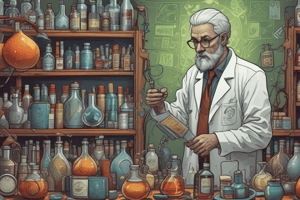Podcast
Questions and Answers
What is another term for a chronic poison?
What is another term for a chronic poison?
- Toxic substance
- Hazardous material
- Acute poison
- Cumulative poison (correct)
What is a characteristic of chronic poisoning?
What is a characteristic of chronic poisoning?
- Immediate effects are always apparent
- Exposure to high levels of a toxic substance is required
- It can only be caused by a single exposure
- Effects develop slowly over time (correct)
Which of the following is an example of a chronic poison?
Which of the following is an example of a chronic poison?
- Mercury (correct)
- Carbon monoxide
- Snake venom
- Alcohol
What is a potential long-term health effect of chronic poisoning?
What is a potential long-term health effect of chronic poisoning?
How can chronic poisoning be prevented?
How can chronic poisoning be prevented?
What is a step in the medical treatment of chronic poisoning?
What is a step in the medical treatment of chronic poisoning?
What can be a result of chronic poisoning?
What can be a result of chronic poisoning?
Why is it important to monitor for long-term health effects after chronic poisoning?
Why is it important to monitor for long-term health effects after chronic poisoning?
Flashcards are hidden until you start studying
Study Notes
Chronic Poison
Definition
- A chronic poison is a substance that causes harm or death over a prolonged period, often through repeated or continuous exposure.
- Also known as a cumulative poison, it can accumulate in the body over time, leading to toxicity.
Characteristics
- The effects of chronic poisoning may not be immediately apparent, but can develop slowly over days, weeks, months, or even years.
- Chronic poisoning can be caused by exposure to low levels of a toxic substance over an extended period.
Examples of Chronic Poisons
- Heavy metals: lead, mercury, arsenic, and cadmium
- Pesticides: DDT, PCBs, and other persistent organic pollutants (POPs)
- Industrial chemicals: asbestos, vinyl chloride, and benzene
- Pharmaceuticals: certain antibiotics, anticonvulsants, and chemotherapeutic agents
Effects of Chronic Poisoning
- Can cause a range of health problems, including:
- Neurological damage
- Organ damage (e.g., kidney, liver, or lung damage)
- Cancer
- Reproductive problems
- Developmental disorders
- Chronic poisoning can also lead to long-term health effects, such as:
- Chronic diseases (e.g., kidney disease, Parkinson's disease)
- Increased risk of certain cancers
- Neurodegenerative disorders (e.g., Alzheimer's disease, Parkinson's disease)
Prevention and Treatment
- Avoid exposure to known chronic poisons whenever possible.
- Wear protective gear and follow safety protocols when handling hazardous materials.
- Medical treatment for chronic poisoning often involves:
- Removing the source of exposure
- Providing supportive care (e.g., fluids, oxygen)
- Administering antidotes or chelating agents (if available)
- Monitoring for long-term health effects
Chronic Poison
Definition and Characteristics
- Chronic poison is a substance that causes harm or death over a prolonged period, often through repeated or continuous exposure.
- Also known as a cumulative poison, it can accumulate in the body over time, leading to toxicity.
- Effects of chronic poisoning may not be immediately apparent, but can develop slowly over days, weeks, months, or even years.
- Chronic poisoning can be caused by exposure to low levels of a toxic substance over an extended period.
Examples of Chronic Poisons
- Heavy metals: lead, mercury, arsenic, and cadmium
- Pesticides: DDT, PCBs, and other persistent organic pollutants (POPs)
- Industrial chemicals: asbestos, vinyl chloride, and benzene
- Pharmaceuticals: certain antibiotics, anticonvulsants, and chemotherapeutic agents
Effects of Chronic Poisoning
Health Problems
- Neurological damage
- Organ damage (e.g., kidney, liver, or lung damage)
- Cancer
- Reproductive problems
- Developmental disorders
Long-term Health Effects
- Chronic diseases (e.g., kidney disease, Parkinson's disease)
- Increased risk of certain cancers
- Neurodegenerative disorders (e.g., Alzheimer's disease, Parkinson's disease)
Prevention and Treatment
- Avoid exposure to known chronic poisons whenever possible.
- Wear protective gear and follow safety protocols when handling hazardous materials.
- Medical treatment for chronic poisoning often involves:
- Removing the source of exposure
- Providing supportive care (e.g., fluids, oxygen)
- Administering antidotes or chelating agents (if available)
- Monitoring for long-term health effects
Studying That Suits You
Use AI to generate personalized quizzes and flashcards to suit your learning preferences.




